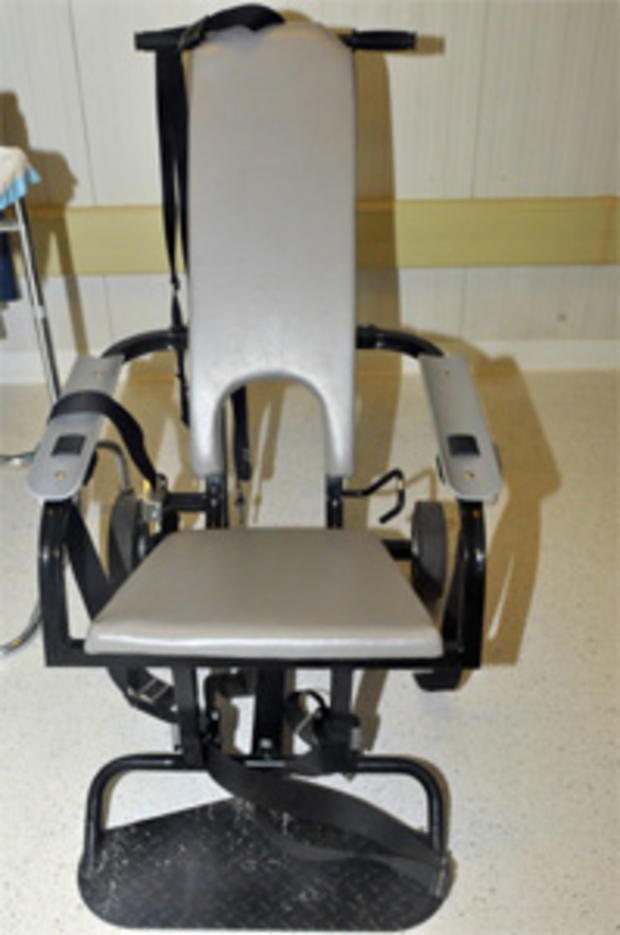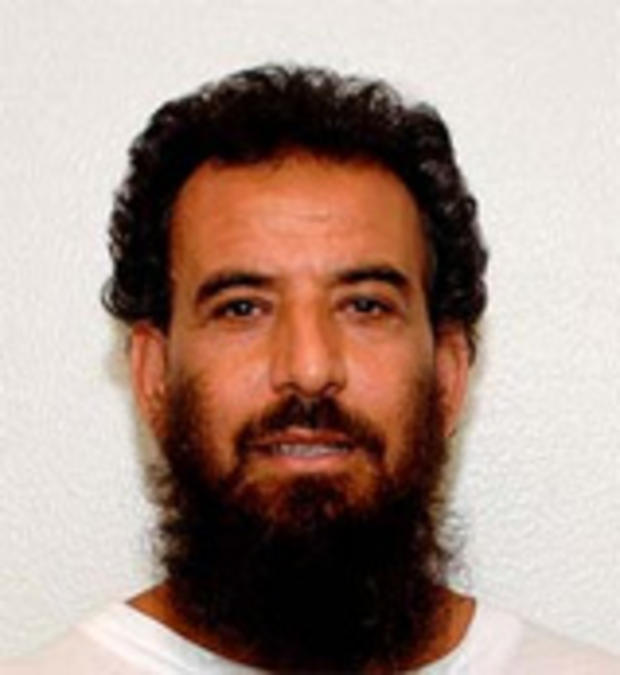Guantanamo hunger strikers: Force feeding tactics "abusive"
NEW YORK More detainees than ever before are being force-fed liquids to keep them alive at the war on terror U.S military prison in Guantanamo Bay, Cuba.
As of Sunday, 37 of 103 detainees acknowledged by the military as participating in a four-month-old hunger strike were receiving enteral, or tube, feedings administered by military medical personnel.
The process involves forcibly strapping a detainee to a chair, inserting a tube down his nose and throat, and pumping liquid Ensure into his stomach.
"For those of us being force-fed against our will, the process of having a tube repeatedly forced up our noses and down our throats in order to keep us in a state of semi-starvation is extremely painful and the conditions under which it is done are abusive," wrote nine of those detainees in a letter sent Friday to an unnamed Guantanamo doctor.
The letter called on the military to allow "independent medical professionals" to treat them instead of military doctors. Last month, around 40 military doctors, nurses, and aides joined staff deployed at Guantanamo to cope with the hunger strike.
"I cannot trust your advice, because you are responsible to your superior military officers who require you to treat me by means unacceptable to me, and you put your duty to them above your duty to me as a doctor," the detainees' letter said.
Those who signed the letter included Shaker Aamer, 47, the last British resident held at Guantanamoand Younous Chekkouri, 44, a Moroccan. Both Aamer and Chekkouri were was approved for transfer from Guantanamo in 2010.
So were four other signatories, according to a list of 56 cleared detainees composed by the Justice Department: Nabil Hadjarab, 33, from Algeria; Ahmed Belbacha, 43, from Algeria; , 41, from Syria; and Adel-Hakeemy, 48, from Tunisia.
All of these men have been held for more than 11 years without charges.
"I do not wish to die, but I am prepared to run the risk that I may end up doing so, because I am protesting the fact that I have been locked up for more than a decade, without a trial, subjected to inhuman and degrading treatment and denied access to justice. I have no other way to get my message across," their letter said.
"We do not respond to detainee letters in the press," said Defense Department spokesman Todd Breasseale, who described the request for independent doctors unprecedented and defended the feedings.
"We will not allow detainees to harm themselves -- not with weapons, not with medication, not via self-imposed starvation to death," Breasseale said. "It's worth noting that not only does our practice match the one followed by the U.S. Bureau of Prisons, but the practice of enteral feeding to prevent self-imposed starvation to death has been upheld by multiple U.S. courts."
Still, the United Nations, the American Medical Association, the American Civil Liberties Union, and human rights groups have condemned the force feedings.
The military had counted 100 hunger strikers for a month before President Obama called on Congressto lift restrictions on detainee transfers in his May 23 speech.
The president said he would lift the moratorium he imposed in three years ago on transfers to Yemen, where 30 other detainees cleared for release are from, and would appoint new envoys at the Defense and State Departments to work on repatriations.
Military guidelines designate a hunger striker as someone who has refused at least nine consecutive meals and lost 15 percent of his ideal body weight.
The hunger strike began in February mainly as a protest against indefinite detention and cell searches where guards ruffled through Korans and confiscated personal items, detainees attorneys have said.
David Remes, a Maryland attorney, said hunger strikers he visited last month "were very weak." Two of his clients were being tube fed, including Yasein Ismael, 34, from Yemen, who told Remes on April 30 he had lost 45 pounds.
"The brothers are desperate. They feel like they are living in graves," Ismael told Remes at that meeting, Remes said. "You cannot imagine the situation here. People walk around like ghosts."
Detainee Uthman Uthman, 34, from Yemen, told Remes in a May 2 meeting that he had lost 50 pounds. "I don't want to be force-fed, but if you force-feed me, at least do it humanely," Remes said Uthman told him.
In recent weeks, Remes and other detainee attorneys said, detainees have been cancelling meetings due to a new, humiliating body search policy imposed by the military before transporting detainees from their cells to another camp with meeting rooms.
The search "requires an intrusive body search of the detainee, which involves touching and holding a detainee's genitals and buttocks," Remes wrote in a motion to stop these searches to be argued this week in Washington, D.C., federal court. "The government had previously recognized that such searches offend and humiliate Islamic detainees and had banned them at Guantánamo," Remes wrote.
He said detainees scheduled to make phone calls from those camps to their attorneys or families must also undergo the searches.


